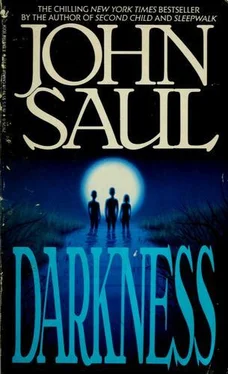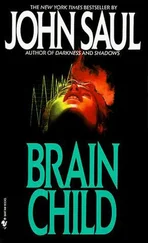John Saul - Darkness
Здесь есть возможность читать онлайн «John Saul - Darkness» весь текст электронной книги совершенно бесплатно (целиком полную версию без сокращений). В некоторых случаях можно слушать аудио, скачать через торрент в формате fb2 и присутствует краткое содержание. ISBN: , Жанр: Ужасы и Мистика, на английском языке. Описание произведения, (предисловие) а так же отзывы посетителей доступны на портале библиотеки ЛибКат.
- Название:Darkness
- Автор:
- Жанр:
- Год:неизвестен
- ISBN:978-0-30776801-8
- Рейтинг книги:3 / 5. Голосов: 1
-
Избранное:Добавить в избранное
- Отзывы:
-
Ваша оценка:
- 60
- 1
- 2
- 3
- 4
- 5
Darkness: краткое содержание, описание и аннотация
Предлагаем к чтению аннотацию, описание, краткое содержание или предисловие (зависит от того, что написал сам автор книги «Darkness»). Если вы не нашли необходимую информацию о книге — напишите в комментариях, мы постараемся отыскать её.
Years ago the Andersons left town with a dream. Now they are back. To live out a nightmare. Something has been waiting for them. Something unspeakably evil. It feeds on the young and the innocent. And soon it will draw their teenage daughter into its unholy embrace….
Darkness — читать онлайн бесплатно полную книгу (весь текст) целиком
Ниже представлен текст книги, разбитый по страницам. Система сохранения места последней прочитанной страницы, позволяет с удобством читать онлайн бесплатно книгу «Darkness», без необходимости каждый раз заново искать на чём Вы остановились. Поставьте закладку, и сможете в любой момент перейти на страницу, на которой закончили чтение.
Интервал:
Закладка:
Mary felt a sinking sensation in her stomach, and gripped Ted’s arm, feeling his muscles stiffen under her fingers.
“Abort—” she breathed. “You mean, she wasn’t trying to—” She hesitated, then made herself complete the sentence. “… to kill herself?”
Hartman shook his head. “I think it was both, Mrs. Anderson.” His eyes darted from Mary to Ted, then back to Mary again. “I’m afraid your daughter has some pretty serious problems.”
“Not nearly as serious as the kid who got her pregnant,” Ted said, his voice dark with anger. “She’s barely sixteen years old. When I get my hands on—”
Hartman’s hands rose again, this time in protest. “Take it easy, Mr. Anderson. The thing is, Kelly isn’t pregnant. I’ve given her a careful examination, and there’s no question about it — as far as I can tell, your daughter has never had sex.”
Confusion clouded Ted’s face. “I–I don’t get it. You said—”
“I know what I said. All I can tell you is that your daughter thought she was pregnant. She was afraid to tell either of you, and she couldn’t remember when or how it had happened. So she decided to kill herself.”
Mary closed her eyes, as if the act could protect her from Hartman’s words. “Dear God,” she whispered. “Why didn’t she talk to us?” But of course she knew the answer — it was the adoption. No matter what she and Ted had ever told Kelly, they had never been able to convince their daughter of their love for her. Reluctantly, Mary had come to believe that from the moment Kelly had learned she was adopted, she had been waiting for her “real” parents to appear and claim her. And in the meantime, it was as if she refused to love them, refused to trust them. Her eyes filled with tears. “Why couldn’t she ask us to help her?”
Hartman shook his head helplessly. “She’s frightened. Frightened, and confused.” He leaned forward, and his voice dropped slightly. “She thinks she’s going to be locked up because she’s crazy. She says nobody loves her, and she doesn’t blame them.” He glanced away, then forced himself to meet the Andersons’ gaze directly. “What she said was that she’s already dead, that she’s always been dead, and that she just didn’t want to pretend to be alive any longer.”
For several moments neither Mary nor Ted said anything. Then, finally, Ted spoke. “What can we do?” he asked.
“Show her she’s wrong,” Dr. Hartman replied.
2
The jangling of the telephone made Carl Anderson groan softly and roll over in bed. The second ring brought him fully awake. He sat up, feeling a twinge of protest from his right hip, and reached out to pick up the receiver, at the same time glancing at the clock on his nightstand.
Six-thirty.
He should have been awake half an hour ago, and by now he should be dressed and in the kitchen, scanning the newspaper while he ate his customary plate of grits, accompanied by half a dozen sausages. “Anderson.” He spoke the single word into the receiver in a carefully developed monotone that would give the caller no hint as to his mood: Carl had learned long ago that the less someone knew about how you were feeling, the less he could manipulate you. But when he heard his son’s voice telling him what had happened the night before, the monotone disappeared. “Oh, Jesus,” he moaned. “Is she going to be all right?”
“The doctor says she’ll heal up in a couple of weeks,” Ted replied. “Anyway, the cuts will.”
Carl frowned, his eyes drifting to the framed photograph on his dresser. His son and daughter-in-law, with his granddaughter between them. He’d looked at the picture a hundred times since Ted had sent it to him last Christmas, his eyes always lingering longest on the image of Kelly, her pale face framed by the strange pink hair, her black clothes making her complexion even pastier by contrast.
But it was Kelly’s eyes that always arrested his attention. They had an empty look to them, as if nothing in the world interested her. There was no sparkle to them, nor even any hostility.
Only a strange lassitude.
Ted’s voice cut through Carl’s momentary reverie. “Dad? You still there?”
“I’m here,” Carl replied, his gaze still fixed on the picture. “What can I do?”
Now it was Ted who was silent for several long seconds. When he spoke, his voice had a reluctant note to it. “The job we talked about last month,” he said finally. “Is it still open?”
Carl frowned. “What about Mary? You know what she says about Villejeune.”
“That was last month,” Ted replied. “After last night …” He left the words hanging, and Carl remembered again the problems he had always had in talking with his son. Indeed, after Bessie had lost her fight with cancer when Ted was still in his teens, he and his son had lived together in a peculiar silence, working together — when there was work — but rarely sharing much in the way of their private thoughts. But at least Ted had been there, his presence a comfort of sorts. It wasn’t until his son had married Mary and moved to Atlanta that Carl began to feel the loneliness of his solitary existence. Then, five years ago, Villejeune had begun to change. Suddenly Carl’s struggling contracting business had taken off.
With that early success, he had started his campaign to bring his son home. A campaign that, until now, had failed completely. The day Ted and Mary had left Villejeune, Mary said she’d never come back. She’d hated the town, hated the swamp, hated everything about the place. She had only agreed to marry Ted on the condition that they move away. And she’d stuck to her word. Obviously, though, everything had changed.
“The job’s here,” Carl said now. “I’ve got a lot going on, and not enough men who know what they’re doing.” He fell silent for a moment, then pressed his original question once more. “Ted, has Mary agreed to all this?”
When Ted replied, Carl could hear the strain in his voice. “She’s not thrilled about it, no. But — look, Dad,” he went on in a rush, as if afraid that if he didn’t spill the words out quickly, he wouldn’t be able to say them at all. “I haven’t worked for a while now, and there just aren’t any jobs. And with the kids Kelly’s been running around with — well, we know we have to get her out of here, and there just doesn’t seem to be anyplace else to go.”
Carl felt a pang of resentment — it wasn’t that they wanted to come home at all. There was just no place else to go. Still, he told himself, at least he’d have them here. And maybe, once Mary saw how Villejeune had changed, she’d want to stay.
After all, like Carl himself, and his dad before him, it was the place she’d been born. It was home.
“Okay,” Carl said aloud. “Just let me know what I can do and when you’ll be here.”
“Thanks, Dad,” Ted said. “It — well, it’s nice to know I can count on you.”
“Nothin’ to it, son,” Carl replied. “If you can’t count on your dad, who can you count on?”
He hung up the phone and got out of bed. Hurriedly, he showered, dressed, and fixed his breakfast, but by the time he stepped out of the house into the damp, hot Florida morning, he was already more than forty minutes behind schedule.
Still, it didn’t matter. He was going to have to see Dr. Phillips about the pain spreading from his hip, so his schedule was in the dumper anyway.
The important thing was that Ted and Mary were finally coming home, and bringing Kelly with them.
• • •
The heat was beginning to build as Carl drove through the village. Carved out of the Florida swamps on the northern edge of the Everglades so long ago that no one really knew when it had been founded, Villejeune had survived for more than three hundred years. Though it had had a few ups, most of its times had been downs, with the people of the town scratching out a living any way they could. There had been a few brief booms — the first during the nineteenth century, when there had been a flurry of plantation development, though the plantations had soon failed, cultivation overtaken by the ever encroaching swamps and marshlands. Prohibition had helped, for the lowlands had offered endless hiding places for small stills that pumped out moonshine night and day, and for a while Villejeune made a good living on the rum-running trade. The Florida land boom had followed, even reaching Villejeune for a few months before people had stopped buying land that was three feet under water. But when Prohibition died, so did the good times for Villejeune. For the next half century it went into a slow but extended decline, the cypress of its buildings slowly succumbing to the inexorable onslaught of the climate, while the people who lived in the buildings did their best to survive an economy as soft and treacherous as the mud beneath the swamp.
Читать дальшеИнтервал:
Закладка:
Похожие книги на «Darkness»
Представляем Вашему вниманию похожие книги на «Darkness» списком для выбора. Мы отобрали схожую по названию и смыслу литературу в надежде предоставить читателям больше вариантов отыскать новые, интересные, ещё непрочитанные произведения.
Обсуждение, отзывы о книге «Darkness» и просто собственные мнения читателей. Оставьте ваши комментарии, напишите, что Вы думаете о произведении, его смысле или главных героях. Укажите что конкретно понравилось, а что нет, и почему Вы так считаете.












